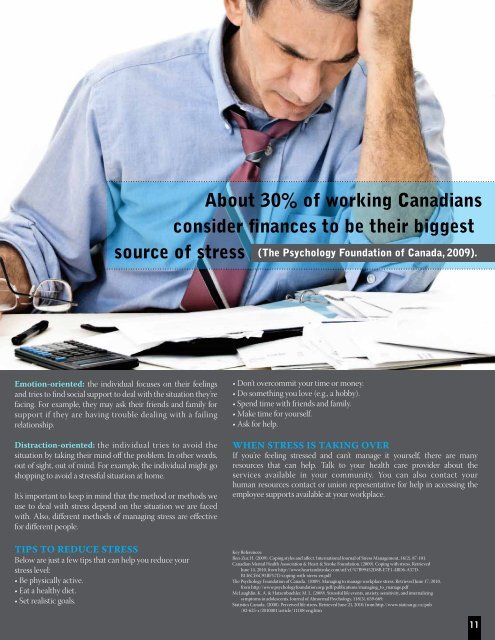Healthy Minds Matter Newsletter and Brochure (pdf)
Healthy Minds Matter Newsletter and Brochure (pdf)
Healthy Minds Matter Newsletter and Brochure (pdf)
Create successful ePaper yourself
Turn your PDF publications into a flip-book with our unique Google optimized e-Paper software.
About 30% of working Canadiansconsider finances to be their biggestsource of stress (The Psychology Foundation of Canada, 2009).Emotion-oriented: the individual focuses on their feelings<strong>and</strong> tries to find social support to deal with the situation they’refacing. For example, they may ask their friends <strong>and</strong> family forsupport if they are having trouble dealing with a failingrelationship.Distraction-oriented: the individual tries to avoid thesituation by taking their mind off the problem. In other words,out of sight, out of mind. For example, the individual might goshopping to avoid a stressful situation at home.It’s important to keep in mind that the method or methods weuse to deal with stress depend on the situation we are facedwith. Also, different methods of managing stress are effectivefor different people.Tips to Reduce StressBelow are just a few tips that can help you reduce yourstress level:• Be physically active.• Eat a healthy diet.• Set realistic goals.• Don’t overcommit your time or money.• Do something you love (e.g., a hobby).• Spend time with friends <strong>and</strong> family.• Make time for yourself.• Ask for help.When Stress is Taking OverIf you’re feeling stressed <strong>and</strong> can’t manage it yourself, there are manyresources that can help. Talk to your health care provider about theservices available in your community. You can also contact yourhuman resources contact or union representative for help in accessing theemployee supports available at your workplace.Key References:Ben-Zur, H. (2009). Coping styles <strong>and</strong> affect. International Journal of Stress Management, 16(2), 87-101.Canadian Mental Health Association & Heart & Stroke Foundation. (2009). Coping with stress. RetrievedJune 14, 2010, from http://www.heart<strong>and</strong>stroke.com/atf/cf/%7B99452D8B-E7F1-4BD6-A57D-B136CE6C95BF%7D/coping-with-stress-en.<strong>pdf</strong>The Psychology Foundation of Canada. (2009). Managing to manage workplace stress. Retrieved June 17, 2010,from http://www.psychologyfoundation.org/<strong>pdf</strong>/publications/managing_to_manage.<strong>pdf</strong>McLaughlin, K. A. & Hatzenbuehler, M. L. (2009). Stressful life events, anxiety, sensitivity, <strong>and</strong> internalizingsymptoms in adolescents. Journal of Abnormal Psychology, 118(3), 659-669.Statistics Canada. (2008). Perceived life stress. Retrieved June 21, 2010, from http://www.statcan.gc.ca/pub/82-625-x/2010001/article/11108-eng.htm11







